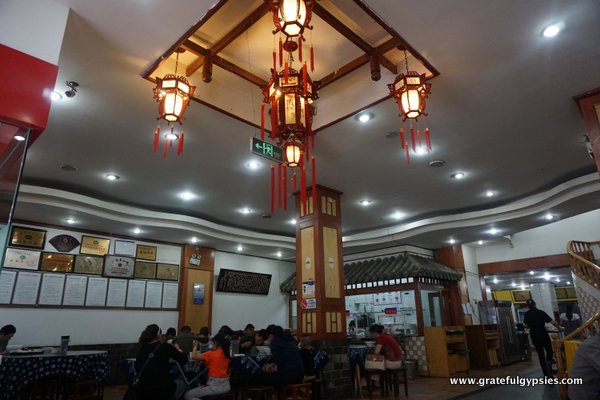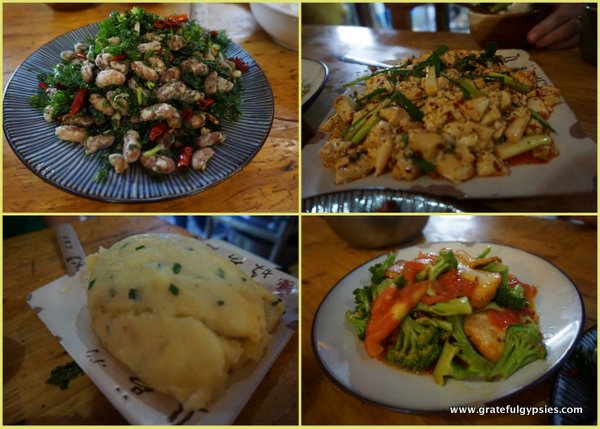Chinese Restaurant Cheat Sheet Posted by sasha on Nov 27, 2017 in Culture
One of the most overwhelming experiences for newcomers to China is walking into a local restaurant and seeing a menu full of nothing but Chinese characters. I remember being terrified in my first few weeks in China every time I walked into such a place. How was I going to order? What if I ended up with a plate of chicken feet? Was I going to be laughed at for my pathetic chopstick skills, which I’d have to attempt since I didn’t even know how to ask for a fork? In an effort to save you the struggle, I’ve put together a Chinese restaurant cheat sheet to help you out.
Restaurant Vocabulary
First off, let’s learn some useful vocabulary that you’ll need in any Chinese restaurant. Here are 30 vocabulary words for going to a Chinese restaurant:
餐厅
餐馆
菜单
筷子
杯子
叉子
刀子
碗
盘子
餐巾纸
服务员
点菜
米饭
面条
饺子
炒菜
蔬菜
汤
肉
鸡肉
牛肉
猪肉
鸭肉
鱼
虾
螃蟹
点心
买单
带走
cān tīng
cān guǎn
cài dān
kuài zi
bēi zi
chā zi
dāo zi
wǎn
pán zi
cān jīn zhǐ
fú wù yuán
diǎn cài
mǐ fàn
miàn tiáo
jiǎo zi
chǎo cài
shū cài
tāng
ròu
jī ròu
niú ròu
zhū ròu
yā ròu
yú
xiā
páng xiè
diǎn xīn
mǎi dān
dài zǒu
restaurant
restaurant
menu
chopsticks
cup
fork
knife
bowl
plate
napkin
waiter
order
rice
noodles
dumplings
stir-fried dish
vegetables
soup
meat
chicken
beef
pork
duck
fish
shrimp
crab
dessert
pay the bill
take away
As you can see, there are a few different words for “restaurant” in Chinese. After over 6 years in China, I never figured out the difference. Use any one of those and you’ll be understood if you’re looking for a restaurant.
How to Order
If the menu is all in Chinese, you can always give it a shot and ask them:
你有英文菜单吗?
nǐ yǒu yīng wén cài dān ma
Do you have an English menu?
If they do, you can get a little bit of help, but this will only happen in big cities like Beijing and Shanghai. Either way, you’ll eventually need to call out:
服务员!点菜!
fú wù yuán! diǎn cài!
Waiter! We’d like to order!
In China, it is perfectly acceptable to yell across the restaurant at the top of your lungs to alert your waiter or waitress. Don’t worry, you won’t be offending anybody, and if you pull the polite, quiet order, you might not get noticed!
Once you’re ready to order, here are a few phrases that can help you out:
你们有什么特色菜?
nǐ men yǒu shén me tè sè cài
What is your specialty?
你可以给我推荐一个吗?
nǐ kě yǐ gěi wǒ tuī jiàn yī gè ma
Can you recommend something?
我不吃肉
wǒ bù chī ròu
I don’t eat meat.
There’s lots of meat in the Chinese diet, but there are several options for being a vegetarian in China.
While you’re at it, you might as well learn some common Chinese dishes. While the cuisine of China is very diverse, there are certain dishes that you see in restaurants all across the country.
As there is a lot of spicy food in China, your waiter might ask you:
你可以吃辣的吗?
nǐ kě yǐ chī là de ma
Can you eat spicy (food?)
You can answer two different ways:
可以
kě yǐ
Yes, I can.
不可以
bù kě yǐ
No, I can’t.
Not all Chinese food is spicy, and if you ever want to spice something up yourself, there’s usually a dish of chili oil (辣椒酱 – là jiāo jiàng) on the table.
When everyone is full and it’s time to go, you’re ready to get the bill (买单 – mǎi dān). You can either treat your guest (请客 – qǐng kè) or go Dutch (AA制 – AA zhì) when it comes to paying up.
China is home to a vast array of different cuisines, and it would be a shame if you came all the way here and ended up eating McDonald’s and KFC simply because you cannot communicate with restaurant staff or understand a menu. Study this cheat sheet back and forth and you’ll be ordering like a local in no time!

Build vocabulary, practice pronunciation, and more with Transparent Language Online. Available anytime, anywhere, on any device.






Leave a comment: